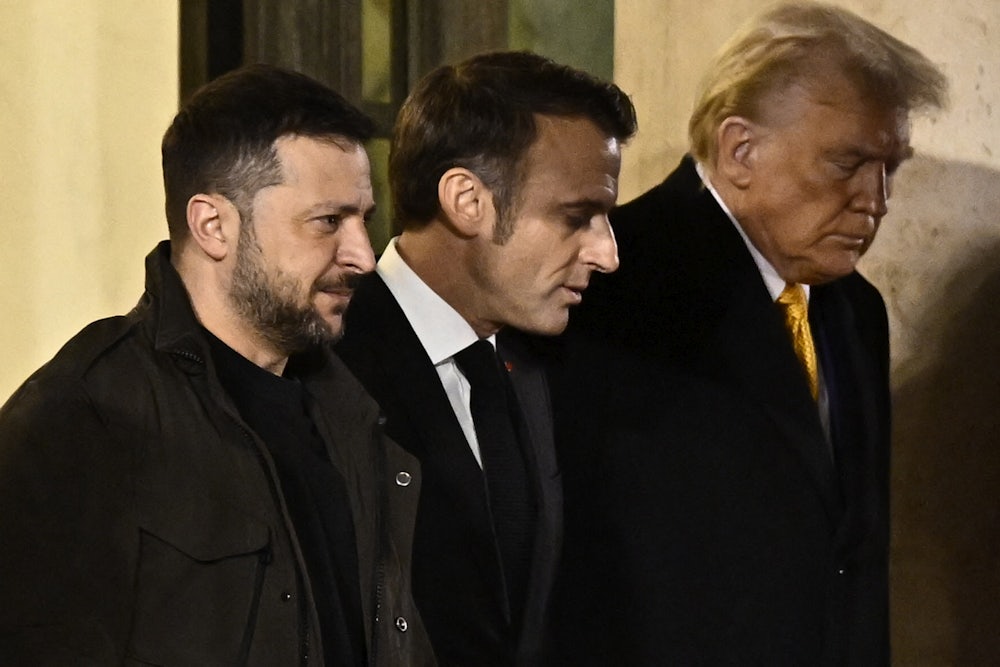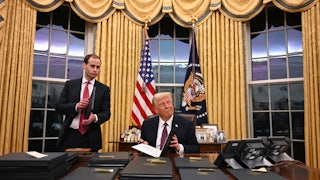It’s a fortunate thing that Bashar Al Assad’s regime collapsed before Tulsi Gabbard became our country’s director of national intelligence. A well-known Assad suck-up, Gabbard might have been able to feed this bloodthirsty tyrant—a man who killed 11,000 or so of his own people with bombs that, upon detonation, indiscriminately released thousands of pieces of metal shrapnel into the air to kill, maim, and disfigure anyone with the bad fortune to be nearby—with all the support he might have needed to stay in power for a few more years.
Assad’s demise is obviously a development to be celebrated. It’s great to see this ruthless authoritarian gone and Iran and Hezbollah weakened, which they are, at least for now. No, we can’t know who or what might fill the vacuum. It’s not like Syria is going to become a peace-loving democracy overnight, but it is nevertheless hoped that the Syrian people, who’ve known nothing but hardship and impunity, might eke out something of a sane and dignified existence. They certainly deserve nothing less.
While we whisper our hopes, however, some caution is definitely in order. Hayat Tahrir Al Sham, or HTS, the group that toppled Assad, has been in control of most of Idlib province in recent years, and the 2020 State Department human rights report notes that the U.N. Commission for the Inquiry of Syria reported that year that HTS “routinely detained and tortured civilians” in territory it controlled. It’s a recurring lesson: One never knows if yesterday’s revolutionaries will round into tomorrow’s statesmen or tomorrow’s tyrants.
The main question here for Americans concerns the fact that in six weeks, Donald Trump is going to be the president of the United States. The surprising events in Syria serve as a harrowing reminder that there’s a big, complicated world out there and, pretty soon, Trump is going to be the single most powerful person in it—the “horse in a hospital” that comedian John Mulaney likened him to, though horses are far less corrupt. And the weird, and worrying, thing is that even though Trump was president before, we don’t really know all that much about his foreign policy instincts because he was never really tested on foreign policy in his first term.
Think about it. There were no major crises during Trump’s term. There were no 9/11 attacks, obviously, but even beyond that, there weren’t any major wars; Russia’s invasion of Ukraine came after he lost reelection. There was no big uprising like the 2014 Maidan Revolution, or the Tahrir Square and Arab Spring revolts of 2011. The Middle East was comparatively quiet, especially to those of us who recall the fraught part of 2006 or the past year’s conflagration that followed in the wake of Hamas’s attacks in Israel. Assad’s butchery was an ongoing affair, but that’s not the same as a new broad regional conflict kicking off, which forces an American president to decide what moral face the United States is going to present to the world. Compared to Barack Obama and Joe Biden, Trump had it pretty easy—it even fell to Biden to keep the commitments to wind down the war in Afghanistan and honor the hideous commitments Trump made to the Taliban, much to Biden’s detriment in public opinion polling.
Of course, to hear Trump tell it, all of these world events pivoted because of him. Russia never would have invaded Ukraine if he’d been in office. Hamas never would have done what it did last October 7 if he’d been around. Trump’s most ardent followers believe all that. Mystifyingly, a majority of Americans believed in 2022 that Putin wouldn’t have invaded Ukraine if Trump had been president.
Did I say mystifyingly? Actually, it isn’t mystifying at all. If you read me regularly enough to know that the power of the right-wing media is one of my regular topics, then you’ll agree with me that a majority of Americans believed Trump’s outlandish claims simply because there exists in this country a multibillion-dollar propaganda network whose mission is to get Americans to believe every word Donald Trump utters.
But I digress. In an odd sort of way, Trump might be right here—but not in a way that flatters him. Putin might not have invaded Ukraine if Trump had been president because he wouldn’t have needed to. Remember—in 2016, candidate Trump suggested that the U.S. should go along with Putin’s annexation of Crimea. And we know Trump didn’t like Volodymyr Zelenskiy, who had dismal poll numbers until the invasion. If Trump had been president in 2022, he probably would have forced Zelenskiy to accept 80 percent of what Putin wanted. So—yes, no invasion, but not a pretty scenario for anyone who respects the rights of sovereign nations to govern their own affairs.
As for Hamas, Trump’s argument is that he cut off Iran, and if he’d been in office, Hamas couldn’t have launched its October 7 action because Iran wouldn’t have been able to finance it. This has been disputed—by none other than his own secretary of state! Trump’s sanctions on Iran did, in fact, lead to a decline in the Islamic Republic’s funding for terror. But that funding absolutely did not disappear. Even Mike Pompeo said so in 2020. And how much did October 7 cost, anyway? It was a one-day, very local incursion that involved 6,000 attackers. I don’t mean to downplay the horror that ensued, but in terms of scale and expense, this wasn’t exactly D-Day.
You will hear Trump speak in the coming days of the “peace” he negotiated in Syria in 2019. This, again, is not entirely a fabrication. But it is a vast embellishment of the facts. He did all but end the American troop presence in Syria. And a ceasefire did ensue. But he abandoned the Kurds, who’d been American allies under both Republican and Democratic administrations. And Putin and Assad weren’t unhappy with the outcome. Trump will also say that he defeated ISIS. Again, sort of true. The U.S. attack on ISIS started under Barack Obama, and Trump merely continued what Obama started. And ISIS isn’t quite really defeated, as we may learn in the coming months.
So where does all this leave us as January 20 approaches? In one of two places, neither of them good.
The first place is an aggressively isolationist one. Over the weekend, Trump posted on social media that the U.S. should not get involved in Syria: “This is not our fight. Let it play out. Do not get involved!” This reflects what he said in announcing the Syrian withdrawal in 2019: “Let someone else fight over this long bloodstained sand.”
That probably sounds fine to most Americans. But what happens if HTS starts detaining and torturing Christians and Alawites? America won’t care about Alawites, but Christians are Trump’s base. Besides, we’re the United States. We’re supposed to give a shit about the slaughter of innocents (at least when we’re not causing or financing it). People from all points on the spectrum heaped abuse on Obama for getting involved in Libya; but remember that Muammar Qaddafi’s son promised that rivers of blood would flow in Benghazi. Our intervention there may have saved many thousands of lives. Is the United States just going to sit back and let Syrians slaughter each other, if that’s where this goes? I fear that the answer to that in Donald Trump’s America might be “Hell, yes.” That isn’t an America I want to be a part of.
The other place we might wind up is one where the U.S. under Trump just becomes another member-state of the Global Authoritarian Caucus—Russia, China, Iran, Egypt, Turkey, Hungary, El Salvador, and so many others. These sorts of despots are the type of corrupt rulers the United States of America used to oppose. Under Trump—who said on Meet the Press Sunday that he might indeed look to leave NATO—it’s a club of maniacs that the U.S. is very likely to join.
Trump was dealt a lucky hand in term one. What if term two finds the world on fire—and the president of the United States is looking to pour gasoline on the inferno?










